“If a child does not see his imprint on the world around him, does he even exist?”
This was the question posed by our colleague, Bente Goldstein, in her keynote address at the Community Education Conference this spring, held at Prairie Hill Waldorf School outside Milwaukee, WI. Bente had just published her book Childhood is a Verb (available on the LifeWays website). 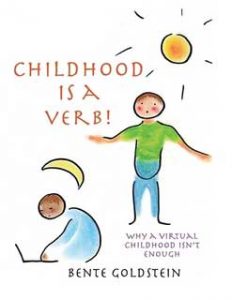 Her keynote speech (and her book) began by examining the virtual, indoor life experienced by most children today that offers very few opportunities for them to contribute in ways that are meaningful and significant to their families and communities. Bente, a Waldorf teacher, has run a farm immersion program for kids on her organic farm in Elkhorn, Wisconsin for decades. She was born and raised in Norway, and her Viking spirit, which has always positively challenged and instructed students in our Wisconsin LifeWays training community, is woven into a strong, practical thread that runs throughout her new book. Her question at the Community Education Conference has really stuck with me since that day in March. Do the experiences we offer children and adolescents give them an opportunity to see their real and lasting imprint on the world around them? Are we giving them work that really matters?
Her keynote speech (and her book) began by examining the virtual, indoor life experienced by most children today that offers very few opportunities for them to contribute in ways that are meaningful and significant to their families and communities. Bente, a Waldorf teacher, has run a farm immersion program for kids on her organic farm in Elkhorn, Wisconsin for decades. She was born and raised in Norway, and her Viking spirit, which has always positively challenged and instructed students in our Wisconsin LifeWays training community, is woven into a strong, practical thread that runs throughout her new book. Her question at the Community Education Conference has really stuck with me since that day in March. Do the experiences we offer children and adolescents give them an opportunity to see their real and lasting imprint on the world around them? Are we giving them work that really matters?
As Bente was speaking, the image of the Amish barn raising came to mind. The barn raising fulfills a practical need (building a barn) while also serving to tie the Amish community together, offering a visible expression of the value of mutual aid. Every member of the community has a role to play – men, women, the elderly and the children. The event is an example of what the Amish refer to as a “frolic”, a work project that is pleasurable, allowing the participants to gain a deep sense of satisfaction from seeing the tangible results of their labor; their imprint on the world right outside their back door.
On a sunny Friday afternoon recently, Bente’s words and the images of the Amish barn-raising ran through my mind more than once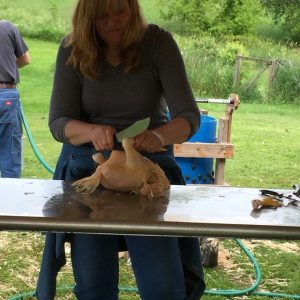 as I stood at a shiny, stainless steel table removing the feet and heads of more than 60 chickens. Some of these were my own birds, raised lovingly from hours-old chicks,
as I stood at a shiny, stainless steel table removing the feet and heads of more than 60 chickens. Some of these were my own birds, raised lovingly from hours-old chicks, 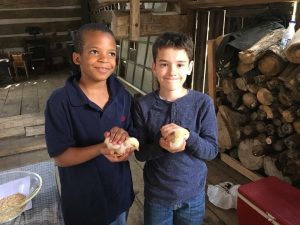 cuddled by children in the Paradise Farm education program and tended with the help of 12-year-old Oscar who fed them, watered them, and moved them to fresh grass every day of their stress-free, pasture-raised lives. The remaining birds being butchered belonged to Gary and Cheri, who graciously invited me and my birds to their farm for harvesting day, sharing their equipment, their expertise and their gracious hospitality. Also invited were various friends, from teens to adults, including
cuddled by children in the Paradise Farm education program and tended with the help of 12-year-old Oscar who fed them, watered them, and moved them to fresh grass every day of their stress-free, pasture-raised lives. The remaining birds being butchered belonged to Gary and Cheri, who graciously invited me and my birds to their farm for harvesting day, sharing their equipment, their expertise and their gracious hospitality. Also invited were various friends, from teens to adults, including 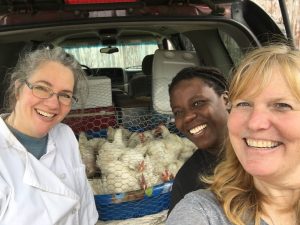 LifeWays North America staff members Michaeleen Hinca and Rhoda Kambandu. Why did all of these folks gather together for an afternoon to volunteer for a task that many people wouldn’t do for considerable pay? We all had our reasons, only one of which was delicious, healthy, humanely-raised and harvested chickens for our families’ tables. The other reasons are a little harder to describe, but I suspect that each of us – teens and adults alike – longed to participate in a community event that helped us see our own imprint on the world around us.
LifeWays North America staff members Michaeleen Hinca and Rhoda Kambandu. Why did all of these folks gather together for an afternoon to volunteer for a task that many people wouldn’t do for considerable pay? We all had our reasons, only one of which was delicious, healthy, humanely-raised and harvested chickens for our families’ tables. The other reasons are a little harder to describe, but I suspect that each of us – teens and adults alike – longed to participate in a community event that helped us see our own imprint on the world around us.
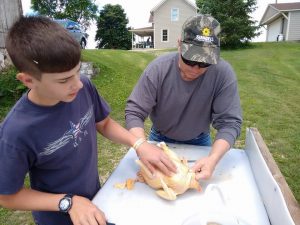
Few opportunities exist in modern life that allow kids and adults to collaborate as equal partners on a task that really matters. Many times we adults, parents and teachers alike, provide “make work” for kids; craft projects that hang on the wall by the dozens, learning activities to keep them busy, and fun, edu-tainment experiences. Even when the task at hand involves real work that needs to be done, like mowing the lawn or cleaning their room, we tend to cut kids a lot of slack, re-doing poorly done work ourselves, or just doing the work ourselves in the first place so we know the task will be done correctly. Chicken harvesting requires all hands to be productive and all work to be done correctly. Everyone present at our chicken harvesting day knew it was no insignificant thing to take the life of an animal to feed ourselves and our families. 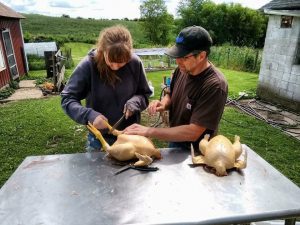 To do the job poorly or foolishly would have been disrespectful to the animal. A humane death was what these birds deserved, and we all took the responsibility seriously. I’ve always suspected that our society’s expectations of adolescents to be angsty, slouchy ingrates who will do the bare minimum to get by creates an unfortunate case of self-fulfilling prophecy. Our chicken harvesting day confirmed that adolescents and young adults rise to the expectations that are held by the community. It also lived up to the Amish name of “frolic” as young and old worked side by side, engaging in pleasant conversation, and finishing off the day by sharing a delicious potluck supper.
To do the job poorly or foolishly would have been disrespectful to the animal. A humane death was what these birds deserved, and we all took the responsibility seriously. I’ve always suspected that our society’s expectations of adolescents to be angsty, slouchy ingrates who will do the bare minimum to get by creates an unfortunate case of self-fulfilling prophecy. Our chicken harvesting day confirmed that adolescents and young adults rise to the expectations that are held by the community. It also lived up to the Amish name of “frolic” as young and old worked side by side, engaging in pleasant conversation, and finishing off the day by sharing a delicious potluck supper.
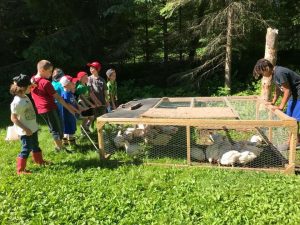
Even before this chicken harvesting day, kids learned the importance of their contribution to the lives of these chickens. Oscar learned early on the significance of moving the chicken tractor with care so as not to catch the legs of the birds under the cage as it moved forward. When the Paradise Farm day camp children pulled the tractor a little too eagerly despite his attempts to caution them, a chicken’s leg was injured. The group of children watched with concern as I gingerly removed the chicken from the cage to inspect its leg. A seven-year old asked, “Can you fix it?” and was mortified when I told him I couldn’t. “This is why we must be careful with the animals,” I said. The children nodded soberly as they helped me isolate the injured bird. They ran to get fresh water and feed for him. One 10-year-old girl said a prayer. Sometimes our impact on the world isn’t what we hope, despite our best intentions, but we can always do something to help.
Making sure the chickens had a good life and a good death was truly a multi-age community effort. Meaningful, purposeful work such as this presents a wonderful opportunity for kids to learn from their elders and help out those younger than themselves. These experiences help kids make a lasting and visible imprint on the world in a way that swiping a screen or commanding “Alexa” or “Siri” do not. Bente’s book, Childhood is a Verb, is full of useful and practical advice cultivated through her years as a Waldorf teacher and director of her farm immersion program, Farmwise. She discusses not only the reasons we should help our children practice being useful, but suggests ways to do just that. In fact, her chapter on helping kids become grounded helped me understand where I went wrong the day the chicken was injured at day camp. Bente says, “In general, when groups of kids arrive on the farm, pouring out of their cars, I would have to characterize them as being ungrounded. I am often worried that we might have an accident on the farm. But then we get to work, digging, fixing, and responding to the farm’s work-demands. When they leave, these same kids are grounded. By the time they leave, I am no longer so worried about accidents!” In our Paradise Farm education program, we usually start with tending to the animals and follow this up by other work such as hauling mulch, digging in the garden, or turning compost. After reading this, I wonder: If the children had done this more grounding work first, would they have been more focused and a little less exuberant in their work with the chickens? I’ll be scheduling things a little differently going forward. Thanks, Bente!
At one time, life itself provided many experiences for children and adults of all ages to “ground themselves” in work that helped them see their positive imprint on the world around them. Today we have to consciously slow down and participate in those life experiences that allow us to see our imprint on our homes, classrooms and communities. I hope you and the children in your care have the chance this summer to experience your own version of a good, old-fashioned “frolic” made up of both hard work and deep satisfaction.
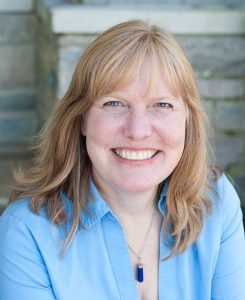
When her own children were young, Mary had a LifeWays home program with such a long waiting list that she decided a LifeWays center was necessary. In 2002, she opened LifeWays Early Childhood Center in Milwaukee where she served as director for 13 years.
Mary has a business degree from University of Wisconsin-Madison and was a student in the very first LifeWays training. She is a lead teacher and Training Coordinator for LifeWays North America and serves as Board President, and in 2010 co-authored Home Away From Home: LifeWays Care of Children and Families with Cynthia Aldinger.
Mary’s favorite thing about LifeWays is seeing both children and their caregivers thrive in a home-like environment that truly values and respects them.